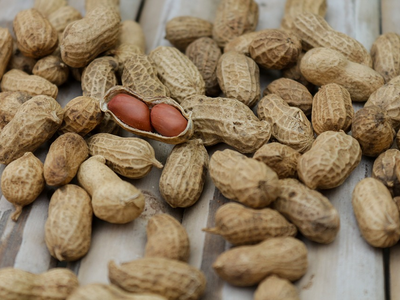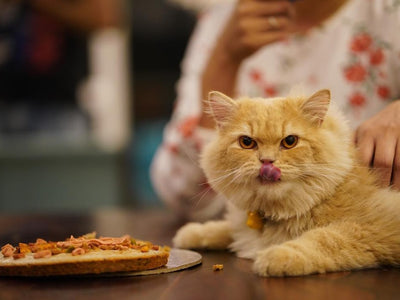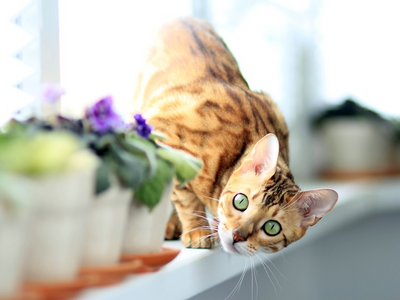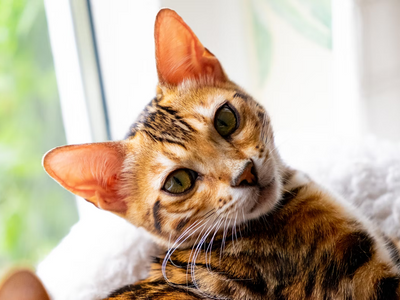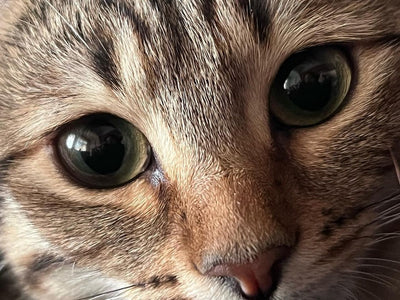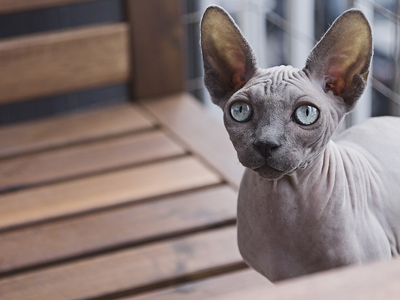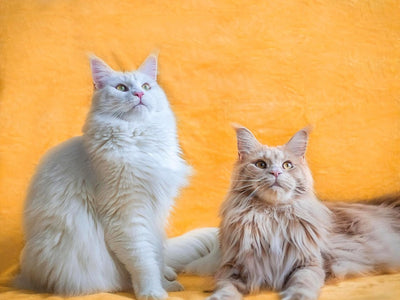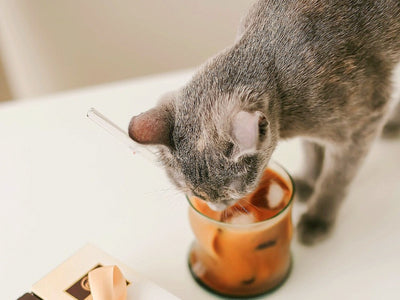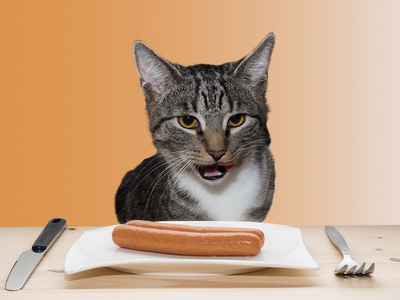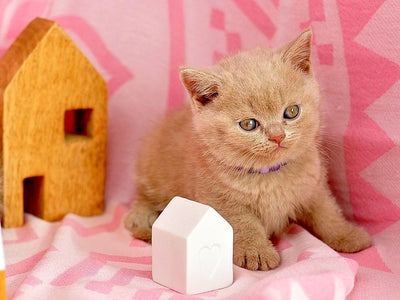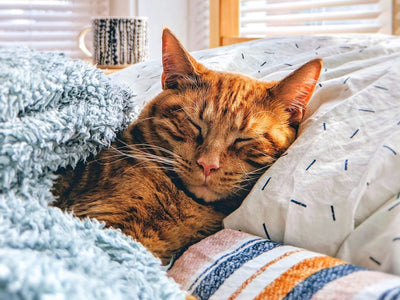21.02.2022
Why do cats eat plants? Should they be on your cat’s menu?
Did you notice your furry friend nibbling on your favourite houseplant or eating grass when outdoors? You might have heard from fellow cat parents that felines do so when they’re sick, so is it a cause for concern?
Cats are obligate carnivores, which means plants are typically not a part of their diet. Why do cats eat plants, then?
Veterinarians don’t know the definitive answer to this question, but most agree that the following causes are common:
- Stress
- Boredom
- Curiosity
- Attraction to the movement of leaves
- Fondness of the taste and smell of a particular plant
- Food, hairballs, or foreign objects stuck in the gastrointestinal tract
Untamed unveils whether feline plant-munching habits are dangerous, how to deal with them, what cats should eat, and which plants cats can eat safely.

I wonder what it’s like to be a herbivore… just kidding!
Source: the.latte_cat
To stop or not to stop cats from eating plants?
Are plants harmful or beneficial to cats? The answer depends on the type of plants, so let’s explore the following:
- Edible plants
- Houseplants
- Outdoor plants
- Psychoactive plants
Can cats eat edible plants?
Veganism is a rising trend—so much that it found its way to the cat food industry. Are cat biscuits containing grains and vegetables adequate for cats? If they have to, cats can survive on plant-based food, but it's nutritionally inadequate and not something that would be a part of their natural diet. Cats are obligate carnivores and rely on meat to get essential nutrients—minerals, vitamins, fatty acids, and amino acids (i.e. taurine). The feline digestive system can't utilise nutrients from any source other than meat and fish (not even milk). Cats fed a vegan diet are at risk of nutritional deficiency.
What’s the fuss with grains?
Many commercial cat food manufacturers use heavily processed grains to boost the calorie content of their products. Such grain fillers are considered empty calories and provide no nutritional value.
Grains are also common allergens and excluded from hypoallergenic cat food products.
Fortunately, you can find a fair share of grain-free products on the market and ensure every calorie counts.
Despite their nutritional shortcomings, grains aren’t completely off the table. If your cat isn’t allergic to grains, they can handle tiny portions of the following ones:
- Rice
- Millet
- Couscous
Can cats eat fruits?
Fruits are not the best food choice for cats because they are too rich in carbs. The allowed daily amount of carbohydrates for cats is 3%, and exceeding it would lead to unhealthy weight gain and health problems associated with it (diabetes, for example). If you decide to include carbs in your cat's diet, they should be in the form of dietary fibre. Some fruits cats can handle in tiny amounts are:
- Apples
- Bananas
- Strawberries
- Avocados

Mother, what is this spiky thing with leaves, and why did you bring it home?
Source: silvia_delle_fave
Can cats eat vegetables?
Cats can eat some vegetables, but since cats can’t utilise nutrients obtained through plants, they are redundant. If you want to give veggie treats to your cat, you should avoid:
- Allium vegetables (garlic, onions, chives, etc.)—They destroy red blood cells and cause hemolytic anaemia
- Raw potatoes and green tomatoes—A substance found in these vegetables, called solanine, is toxic to cats
- Spinach—A substance found in spinach (calcium oxalate) could worsen any existing urinary problems in cats and cause the development of struvite crystals
If your cat is fond of vegetables, here are some they can eat in moderation:
Is plant-based food completely off the table?
You can give grains, fruits, and veggies to your furry friend occasionally, but there are some exceptions.
The following table contains food products that are harmful, or even toxic, to cats:
|
Category |
Products |
|
Harmful products |
|
|
Toxic products |
Are houseplants safe for cats to eat?
Some houseplants are safe, but many cause stomach upsets and numerous are confirmed as toxic to pets. Consult the following table to find out which popular houseplants are safe and which aren't:
|
Safe for cats |
Toxic to cats |
|
|
Are outdoor plants safe for cats to eat?
If your cat goes on outdoor adventures, you might have seen them nibble on some plants, but is that behaviour safe for them? Let’s see what happens when cats eat the two most common outdoor plants:
- Grass
- Trees
Can cats eat grass?
Cats can eat grass, but they struggle to digest it, and it has no nutritional value for them. This means that your cat will either expel any grass they eat through their rear end or regurgitate it.
Veterinarians are yet to determine the definitive reason why felines nibble on the grass, but some theories claim that it:
- Provides folic acid—Folic acid is used in the production of haemoglobin, a protein present in red blood cells that transports oxygen throughout the body
- Helps with digestion and settles an upset stomach—Cats could eat grass to trigger vomiting of any suspicious contents they have ingested. Eating grass could also help with the passage of stuck hairballs
- Is a natural antiparasitic—Antiparasitic drugs weren’t always available to cat parents, so felines used to nibble on grass to get rid of parasites
- Relieves stress—Veterinarians speculate that grass is comfort food for stressed cats
Cats don’t have to eat grass to experience these benefits—any type of quality cat food will achieve the same effect without causing felines to regurgitate or have unpleasant number twos.
Is it normal for cats to nibble on wood and tree bark?
Nibbling on trees (or other odd plants and objects) is a typical symptom of pica syndrome—a behavioural urge to eat non-edible materials. If you notice your cat chewing tree bark, you should do the following:
- Take your cat to the vet to check if the tree bark has done any internal damage and whether bits of it are stuck in your cat’s gastrointestinal tract
- Consult the vet about methods that will help curb such behaviour
- Follow the vet’s instructions and monitor your feline closely
Besides tree bark, other objects cats suffering from pica chew and swallow include various fabrics, paper, and plastic.
Are psychoactive plants safe for cats to eat?
Funny plants can attract your feline, but the safety and effects vary depending on the type of plant. Let’s find out what happens when cats ingest:
- Catnip
- Cannabis
Do cats eat catnip, and what happens if they do?
Fresh or dried, catnip is is a guilty pleasure for many cats. The effect this herb has on your furry feline depends on their preferred way to consume it—they can inhale or eat it.
When cats eat catnip, they experience a mellowing effect, as if they were on a mild sedative—they start to drool, purr lightly, disassociate, and eventually go to sleep.
Before letting your cat have a whiff or nibble of catnip, keep in mind that the fresh plant is more potent than the dried variant, so you should adjust the dosage accordingly. An average 3–4 kilo cat can have one teaspoon to one tablespoon of dried catnip and only tiny bits of the fresh herb. Sensitive cats might even need smaller amounts to feel the effect.
Cats who enjoy too much catnip can experience stomach upsets and become immune to the plant’s effect.

Mum, I don’t know what this is, but keep it coming!
Source: zoe_sky_panda_cats
What would happen if a cat were to take cannabis?
Cannabis has the same effect on humans as catnip has on cats. While some people have experimented with using catnip as a substitute for cannabis, cats should never be exposed to marijuana or any product containing it (for example, brownies or butter).
The substance present in cannabis that relaxes humans—Delta-9 Tetrahydrocannabinol—is toxic to cats and causes the following symptoms:
- Loss of coordination
- Lethargy
- Agitation
- Anxiety
- Vomiting
- Low heart rate
- Seizures
My cat eats plants. Should I visit the vet?
Did your furry friend reject their favourite wet food more than once, and now you suspect it has something to do with their plant-eating habits? If your kitty ate a harmful plant, they will show the following symptoms:
- Loss of appetite
- Lethargy
- Salivation
- Twitching
- Irritation of the skin, gums, or eyes
- Nausea
- Diarrhoea
- Confusion and overall incoordination
- Difficulty breathing (frequent sneezing or dry heaving)
- Seizures
Take your cat to the vet immediately if you notice these symptoms. The early stage of toxicosis has the same symptoms as many other non-lethal conditions, such as food intolerance. Only a vet can set the correct diagnosis and administer appropriate treatment, and the sooner you go, the better.
How to keep cats from eating plants that are harmful to them
You can stop your cat from eating harmful plants (or non-toxic plants you love a lot) by:
- Removing the plants from your home—Determine which plants are on the no-no list and keep them out of your cat’s reach
- Dedicating one room in your home to plants—Move all of your houseplants to one room and lock it so that you’re certain your cat can’t reach them
- Providing other forms of stimulation—Entertain your cat with new toys and food puzzles. If boredom was the reason for your cat’s munchies, you should notice fewer missing plant leaves
- Spraying the pots with a homemade or commercial cat repellent—Mix one part vinegar with three parts water and spray the mixture on plants your cat likes. The bitter taste of vinegar will prevent your feline from snacking on plants again. Mixing water with lime, lemon, or citrus oil and spraying a plant pot with that mixture will keep your cat from approaching the plant at all. You can also find commercial cat repellent products in any pet store
- Giving your furry friend a cat-safe garden—Dedicate one part of your garden to your furry friend and fill the space with plants that are safe for cats to eat
- Using motion-sensitive gadgets—Install lights or sprinklers with motion sensors, depending on when your cat gets the munchies. If your cat usually nibbles on plants during the day, the sprinkler will deter them from trying. Lights work better on cats with midnight munchies
- Getting plants your cat won’t be tempted to chew—Plant roses in your garden or get cacti for your home
How to prevent cats from developing plant-eating habits
You can prevent cats from eating plants by:
- Removing any known stressors
- Making sure their nutritional needs are met
How does stress make cats eat plants?
Some veterinarians suspect that cats who are under a lot of stress consider plants their comfort food. This unhealthy coping mechanism can be kept under control by eliminating stressors surrounding your furry friend. The most common stressors for cats are:
- New animals
- New people
- Loud noise
- Sudden relocation (moving homes or being taken care of by a family friend they haven’t met before)
How does nutritional deficiency make cats eat plants?
Healthy and happy cats whose nutritional needs are fulfilled are less likely to eat plants. Every cat’s daily food intake should consist of more than 50% protein, up to 20% fat, and less than 3% carbs.
Water intake is also important. Your feline should get moisture from food, as their wild cousins do. Cat parents should exercise caution if their furry friend is on a dry-food-only diet, as their cat might need to drink more water to meet their daily needs. Wet food is better at keeping your cat hydrated, which is why veterinarians recommend giving it to your cat as at least one of their daily meals.
If your plant-eating cat isn’t too fond of wet food, you can try the following methods to spark their interest in it:
- Mixing wet and dry cat food
- Pouring meat soup or bone broth over cat biscuits
What’s better for cats than plants? Meat and fish!
Food of animal origin can provide the same benefits some plants (such as grass) can but without causing stomach upsets or making your cat regurgitate. You can improve your cat’s digestion and alleviate hairball-related problems by:
- Serving your cat several smaller meals per day
- Switching your furry friend to high-quality wet food
Some food is easier for cats to digest and absorb nutrients from because of the higher bioavailability index. Cat food ingredients with the highest bioavailability are:
- Chicken (98%)
- Duck (98%)
- Turkey (98%)
- Tuna (94%)
- Salmon (94%)
- Mackerel (94%)
- Prawns (94%)
- Sardines (94%)
- Shrimp (94%)
Many commercial products feature these ingredients on their labels, but it doesn’t necessarily mean that they are the best choice for felines. The following table provides details on how to differentiate high-quality cat food from subpar products:
|
High-quality cat food |
Poor-quality cat food |
|
|
Cats fed quality cat food look healthier, have more energy, and seem happier. If you want your furry friend to thrive, switch them to Untamed.
Untamed is raising the bar in the cat food industry, tin by tin
With so many suspicious products on the market, choosing the right cat food can prove quite the challenge. Every cat deserves premium-quality food made from human-grade ingredients. Our vet-formulated recipes meet the nutritional needs of all cats, regardless of their:
- Life stage—Untamed works for kittens (after weaning), adults, and seniors
- Breed—Our clowder is diverse and has members who are Persian, Siamese, Bengals, Ragdolls, Maine Coons, and British Shorthairs
Sterilised and pregnant cats can also enjoy our jelly and gravy products.
We use gentle cooking methods to lock in all of your cat’s favourite natural flavours and the nutrients they need.
Once your kitty tries Untamed, you won’t need to worry about your plants anymore. Our delicacies have won the hearts of the pickiest cats, while our ethical production methods earned the trust of many cat parents. The following table lists the changes many satisfied clients noticed after letting their furry friends try Untamed:
|
When did the change happen? |
What changed? |
|
Week one |
Less mess in the litter tray and no stomach upsets |
|
Month two |
Increased energy levels and improved muscle tone |
|
Month four |
Flawless coat and fewer hairballs to stumble upon |
|
Month six and onwards |
Natural weight control and strong immune system |
Join the Untamed clowder—take our short quiz and order your tailor-made meal pack in a snap!

You’re lucky you feed me well. Otherwise, I wouldn’t tolerate these outbursts of affection.
Image (c) Untamed
How to order your first Untamed pack effortlessly
We have one of the best online cat food stores in the UK—the process of ordering Untamed’s homemade-tasting delicacies takes no longer than two minutes. All you need to do is:
- Visit our TRY NOW page
- Answer a few short questions
- Review and confirm your order
Your first meal pack will be with you in one business day via free carbon-neutral shipping. If your furry friend enjoys the meals and asks for more, we can deliver the products to you around the same time every month. You’re in charge of your plan, so you can always modify, delay, pause, or cancel your monthly cat food delivery.

Mum, is there any chance we could get a box like this a little more often?
Image (c) Untamed
Snack ideas to help you stop your cat’s plant-chewing habits
The following snacks combined with other distraction methods will help you stop your cat from eating your beloved houseplants and ravaging your outdoor garden:
- Cold cuts—No cat can resist a tiny bit of ham or bacon, but keep the portions small because they have a high calorie content
- Cheese—This fatty dairy delicacy is many cats’ favourite snack if fed in moderation
- Boiled and shredded chicken breast—Cats will appreciate the texture of chicken, but make sure it’s unseasoned to avoid stomach upsets or potential poisoning
- Chicken liver—Tiny portions of liver will boost your cat’s vitamin A levels

![Associated image for What human food can Sphynx cats eat? [Comprehensive list]](http://untamed.com/cdn/shop/articles/what_human_food_can_sphynx_cats_eat_Featured_400x300_crop_center.jpg?v=1648705074)
